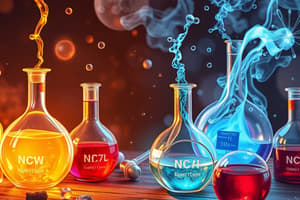Podcast
Questions and Answers
What is the term for the reaction in which two or more substances combine to form a new substance?
What is the term for the reaction in which two or more substances combine to form a new substance?
- Decomposition reaction
- Displacement reaction
- Combination reaction (correct)
- Neutralisation reaction
What is the term for the substances that are present at the start of a chemical reaction?
What is the term for the substances that are present at the start of a chemical reaction?
- Compounds
- Elements
- Products
- Reactants (correct)
What is the term for a substance that is made up of two or more different elements, chemically bonded together?
What is the term for a substance that is made up of two or more different elements, chemically bonded together?
- Mixture
- Element
- Solution
- Compound (correct)
What is the term for the particles that have a charge, either positive or negative, and are the building blocks of many substances?
What is the term for the particles that have a charge, either positive or negative, and are the building blocks of many substances?
What is the term for the representation of the chemical composition of a substance?
What is the term for the representation of the chemical composition of a substance?
What is the term for the reaction in which an acid reacts with a base to form a salt and water?
What is the term for the reaction in which an acid reacts with a base to form a salt and water?
What is the term for a change in which the state, shape, size or colour of the substance might change?
What is the term for a change in which the state, shape, size or colour of the substance might change?
What is the result of a neutralisation reaction?
What is the result of a neutralisation reaction?
What type of reaction is Fe + CuSO4 -> FeSO4 + Cu?
What type of reaction is Fe + CuSO4 -> FeSO4 + Cu?
What is the chemical formula of Calcium carbonate?
What is the chemical formula of Calcium carbonate?
What is the result of the combination of Nitrogen and Hydrogen?
What is the result of the combination of Nitrogen and Hydrogen?
What is the term for a substance that is made up of atoms of the same kind?
What is the term for a substance that is made up of atoms of the same kind?
What is the chemical symbol for Silver?
What is the chemical symbol for Silver?
What is the term for the breaking up of water into hydrogen and oxygen?
What is the term for the breaking up of water into hydrogen and oxygen?
Flashcards are hidden until you start studying
Study Notes
Chemical Substances and Processes
Elements and Compounds
- Iron is an element because it is made up of the same kind of atoms.
- Elements are pure substances that consist of only one type of atom.
Chemical Reactions
- Chemical reactions involve the transformation of one or more substances into new substances.
- Burning of a candle is an example of a chemical reaction.
- Acid + base → salt + water (e.g., sodium hydroxide + hydrochloric acid → sodium chloride + water).
Types of Chemical Reactions
- Combination reaction: two or more substances combine to form a new substance.
- Decomposition reaction: a single substance breaks down into two or more substances.
- Displacement reaction: one element displaces another element from a compound (e.g., Fe + CuSO4 → FeSO4 + Cu).
Physical Changes
- Physical changes involve a change in state, shape, size, or color of a substance without changing its chemical composition.
- Examples of physical changes include melting of a candle, breaking up of water into hydrogen and oxygen, and curdling of milk.
Chemical Changes
- Chemical changes involve a change in the chemical composition of a substance, resulting in a new substance.
- Examples of chemical changes include burning of a candle, decomposition of limestone, and neutralization reaction between an acid and a base.
Ions and Chemical Formulae
- Ions are charged particles that make up many substances.
- Chemical formulae represent the chemical composition of a substance.
- Examples of chemical formulae include CaCO3 (calcium carbonate), NaOH (sodium hydroxide), and H2O (water).
Symbols and Charges
- Chemical symbols represent elements (e.g., K for potassium, Fe for iron, Ca for calcium).
- Ions have charges (e.g., sulphate ion (SO42-), nitrate ion (NO3-), oxide ion (O2-), chloride ion (Cl-), magnesium ion (Mg2+), copper ion (Cu2+)).
Miscellaneous
- Mixtures are not pure substances, but a combination of two or more substances in any ratio.
- Lemonade and soil are examples of mixtures.
- Products are substances formed as a result of a chemical reaction.
- Reactants are substances that undergo a chemical reaction to form products.
Studying That Suits You
Use AI to generate personalized quizzes and flashcards to suit your learning preferences.




